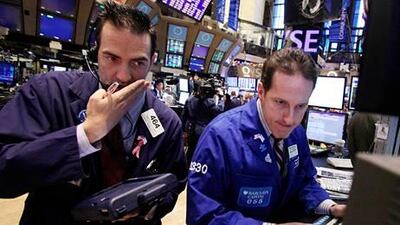Last year was a year to forget for most investors. Only one major equity market, that of the US, managed to keep its head above water. All the rest of them fell, some significantly so.
We all know the reasons why: earthquakes, a tsunami, but especially the inability of the US and European governments to pay off their monumental debts. These events created uncertainty and markets don't like uncertainty.
It was a year filled with geo-economic and political crises that took their toll on financial markets. Even balanced portfolios with diverse and appropriate exposure to major market equities, developing-market equities, government bonds, investment-grade bonds, emerging-market debt, fixed-interest instruments, hedge funds and money markets were generally down about 4 per cent to 10 per cent, depending on the amount of risk taken.
When reviewing this kind of performance with clients, I point to the long term and say that, in the end, capitalism will prevail; equity markets will recover and shareholders will get their just rewards for taking risks.
If this weren't the case, then investors would choose to put their money in cash and bonds where, theoretically, the risks are lower. But if everybody did this, capitalism would collapse. Nobody would be investing in manufacturing and service industries and we would all be reduced to a serf-like existence scratching a living out of the soil (a bit like my planned retirement!).
To invest or not to invest: that is the question. Whether it is nobler in the mind to suffer the slings and arrows of outrageous equity performance or to take arms against a sea of volatility and, by opposing it, die in a worthless government bond and end the heartache and the thousand natural shocks that flesh is heir to (yes, you've guessed: I watched Hamlet on TV the other night and was inspired by Shakespeare's, hitherto, unknown grasp of financial markets and financial planning). My money is on the slings and arrows.
London's Financial Times (FT)has recently been running a series of articles on capitalism, suggesting that it is in a state of crisis and in need of an urgent overhaul.
Although it points to weaknesses in the system that allowed, for instance, over exuberant bank mortgage lending that, in turn, led to the sub-prime mortgage debacle in the US and, ultimately, to the credit crisis that has engulfed the world economy for the past few years, the underlying message is that capitalism thrives on crises. It learns from the experience and emerges stronger.
The author of the latest article in the FT series, Martin Wolf, reminds his readers that crisis is a terrible thing to waste and capitalism, like human beings, is imperfect, "but it is a uniquely flexible, responsive and innovative economic system".
"It may be in crisis now," he writes, "but it is still among humanity's most brilliant inventions. It is the basis for the prosperity that so many of us now enjoy and many more aspire to. It is transforming the lives of billions of people. Let us strive to make it better."
Although the powers that be respond to Wolf's cry and strive to improve the system, the rest of us must watch and worry as our investments respond more immediately to the current crisis. Fortunately, the rot appears to have abated - at least for the time being.
Over the past week, Wall Street touched five-month highs, reflecting a string of positive data releases and good corporate earnings. The FTSE100 was driven to a six-month high principally because of gains in the financial sector, allowing it to break the 5,700 level.
The FTSE Eurofirst300 index of European equities advanced for a fifth successive week, also touching a five-month high on the way and indicating, perhaps, that investor concern over the euro zone debt crisis is showing signs of easing. And in Asia, the equity markets in Japan, Hong Kong and Shanghai all showed strong performances.
Markets are responding to a number of factors: successful euro zone debt auctions, encouraging global economic data and improved corporate earnings in the US. As a result of this rosier picture of the future, the VIX Volatility Index has fallen to its lowest level since July last year. This index attempts to quantify the future volatility in the S&P500 index and it is often referred to as Wall Street's "fear gauge".
Portfolio managers sometimes buy into this index to protect their investments against future volatility. If asset prices lose value because of high volatility, then exposure to the VIX Volatility Index can provide some protection. Currently, the value has fallen drastically because investors are beginning to see that there is light at the end of the tunnel.
But there are still dangers ahead. One area of growing concern is Portugal, which could follow in the footsteps of Greece. Markets responded to this risk by forcing up the yields on Portugal's sovereign debt (this results from reduced demand for Portugal's bonds and, therefore, lower bond prices) and increasing the cost of insuring against a default.
But in general, the good news on the US and world front appears to be outweighing the negative news on euro zone debt.
If you held firm with your equity exposure over the past few months and avoided panic selling, then you should congratulate yourself... or your hard-working, under-appreciated financial adviser. Give him (or her) a call. Clients are quick to blame their advisers for the world's financial woes, but rarely give them credit when they sort out such problems as the euro zone debt crisis on the back of a paper serviette.
Bill Davey is a wealth manager at Mondial-Financial Partners in Dubai. Contact him at bill.davey@mondialdubai.com.

